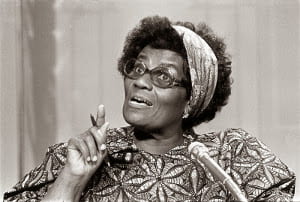In this next post by Kate Skinner, Professor of African History at the University of Bristol, we celebrate the life and work of Annie Jiagge, an international jurist, for Black History Month 2023.
Born in 1918, Annie Jiagge (née Baëta) was one of a small but growing number of girls in the Gold Coast (Ghana) to attend school, pass the standard VII certificate, and train as a teacher. With the financial support of her mother, however, Annie soon travelled to London, where she studied at the London School of Economics and Lincoln’s Inn. She returned to the Gold Coast as a qualified lawyer in 1950, working first as a barrister and then as a magistrate.
Ghana became independent from British colonial rule in 1957. By 1961, President Kwame Nkrumah had appointed Annie Jiagge as a high court judge – one of very first women in the Commonwealth to achieve such a position. Following her appointment to the United Nations Commission on the Status of Women, Annie Jiagge drafted a working document which later became the Declaration on the Elimination of Discrimination Against Women. The declaration was adopted by the United Nations General Assembly in 1967.
The International Women’s Year of 1975 gave additional impetus to proposals to develop the declaration into a binding international convention. Work proceeded through the first few years of the United Nations Decade for Women. In 1979, the United Nations General Assembly approved the Convention of the Elimination of All Forms of Discrimination Against Women (CEDAW). Ghana, along with 63 other states from all around the world, signed the CEDAW in July 1980, at the Copenhagen Conference that marked the mid-way point of the Decade for Women.
The CEDAW proved crucial in defining discrimination, and in setting out obligations on states-parties to enact laws and formulate policies to eliminate discrimination against women. It has spurred mobilisations for gender equality in many countries all around the world for more than forty years.
You can learn more about the remarkable life of Annie Jiagge in the United Nations-sponsored film Fear Woman, and the recent documentary When Women Speak. Both are free-to-view online.
We asked Kate, what drew you to Jiagge?
“Like millions of women around the world, I benefit every day from the international Convention on the Elimination of All Forms of Discrimination Against Women. The convention has prompted women in many countries to mobilise against discrimination, and whilst there is still considerable work to be done, important victories have also been won. I am grateful to Annie Jiagge for her role in the initial development of the convention.”
About the Author
Prof Kate Skinner joined the History Department at the University of Bristol in February 2023. She is currently researching the political history of reforms to laws on inheritance, divorce, child maintenance, adoption, and abortion in postcolonial Ghana.

